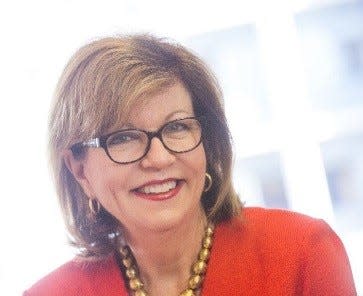Election 2020: Chris Wallace, Susan Page among moderators for presidential and vice presidential debates
- Oops!Something went wrong.Please try again later.
- Oops!Something went wrong.Please try again later.
WASHINGTON – Moderators are set for the presidential and vice presidential debates, which will kick off later this month and begin perhaps the most important phase before the Nov. 3 election.
The Commission on Presidential Debates on Wednesday announced moderators for the three presidential debates between President Donald Trump and Democratic nominee Joe Biden and one vice presidential debate, a lineup that includes Fox News anchor Chris Wallace and USA TODAY Washington Bureau Chief Susan Page.
All four debates will be moderated by a single individual, a slight departure from four years ago when one of the presidential debates had two moderators.
Wallace will serve as moderator for the first debate between Trump and Biden on Sept. 29 at Case Western Reserve University and Cleveland Clinic in Cleveland.
Page will moderate the vice presidential debate between Vice President Mike Pence and Democratic vice presidential nominee Kamala Harris on Oct. 7 at the University of Utah in Salt Lake City.

Steve Scully, senior executive producer and political editor at the C-SPAN Networks, will moderate the second presidential debate, a town hall format on Oct. 15 set for the Adrienne Arsht Center for the Performing Arts in Miami.
The third and final presidential debate, Oct. 22, at Belmont University in Nashville, Tennessee, will be moderated by Kristen Welker, co-anchor of NBC's "Weekend TODAY" and a White House correspondent for NBC News.
More: Competing parties, clashing realities: Campaign's final sprint opens as conventions end
"The debates are a crucial part of making our democracy work, and I am honored to participate," Page said.
With party conventions over, the debates stand as perhaps the most crucial opportunities left for candidates to make their cases in a race largely absent of traditional campaigning because of the coronavirus pandemic.
A USA TODAY/Suffolk University Poll released Wednesday found Biden leading with support from 50% of registered votes, topping Trump's support 43%. But it marks a tightening of the race after Biden was found ahead by 12 percentage points by the same pollster in June.
The moderator selections comes after the Trump campaign last month unsuccessfully pushed the commission for a fourth debate for the beginning of September to try to get ahead of mail-voting and early voting that will begin in 16 states before Sept. 29, when the first debate is set.
More: Panel rejects Donald Trump's request to add a fourth debate with Joe Biden
The Trump campaign also suggested a list of potential moderators – 24 in all, some known for their conservative leanings – for the commission to select. Neither Wallace, Page, Scully nor Welker were among the campaign's suggestions.
In a joint statement, the Commission on Presidential Debate's three co-chairs, Frank J. Fahrenkopf Jr., Dorothy S. Ridings and Kenneth Wollack, thanked the journalists for their involvement.
"We are grateful to these experienced journalists, who will help ensure that the general election presidential debates continue to serve their unique educational purpose of helping the public learn about the candidates," the co-chairs said. "Each individual brings great professionalism to moderating and understands that the purpose of the 2020 debate formats is to facilitate in-depth discussion of major topics."
But the Trump campaign pushed back at the selections.
"These are not the moderators we would have recommended if the campaign had been allowed to have any input," said Tim Murtaugh, the Trump campaign's director of communications, adding that some can be identified as "clear opponents of President Trump," giving Biden a "teammate on stage."

The Biden campaign had no objections. "As Joe Biden has said for months – without farcical antics – he looks forward to participating in the debates set by the commission, regardless of who the independently chosen moderators are," Biden campaign spokesman Andrew Bates said.
By choosing one moderator from Fox News and another from NBC, the commission tapped reporters from one network often praised by Trump and another often criticized.
And yet Wallace, who hosted the final debate between Democrat Hillary Clinton and Trump four years ago, conducted one of the toughest recent interviews with the president. Wallace pressed Trump last month on the nation's uptick in conoravirus cases and questioned a cognitive test that Trump has trumpeted to boast about superior mental fitness than Biden.
Each debate will run from 9 p.m. to 10:30 p.m. EDT.
The first and third presidential debates will be divided into six 15-minute segments, each devoted to different topics that will be announced one week before they take place. The moderator will begin each segment with a question. Biden and Trump will have two minutes to respond, with candidates also having an opportunity to respond to each other.
The second debate's town hall format will feature questions posed by South Florida voters not committed to either candidate. Biden and Trump will again have two minutes to respond to each question with an additional minute reserved for the moderator to facilitate further discussion.
The vice presidential debate will be divided into nine segments of approximately 10 minutes each, with both Harris and Pence also having two minutes apiece for each answer. The moderator will use the remainder of the time in each segment to continue the discussion.
Reach Joey Garrison on Twitter @joeygarrison
This article originally appeared on USA TODAY: Election 2020: Chris Wallace, Susan Page among moderators for debates

